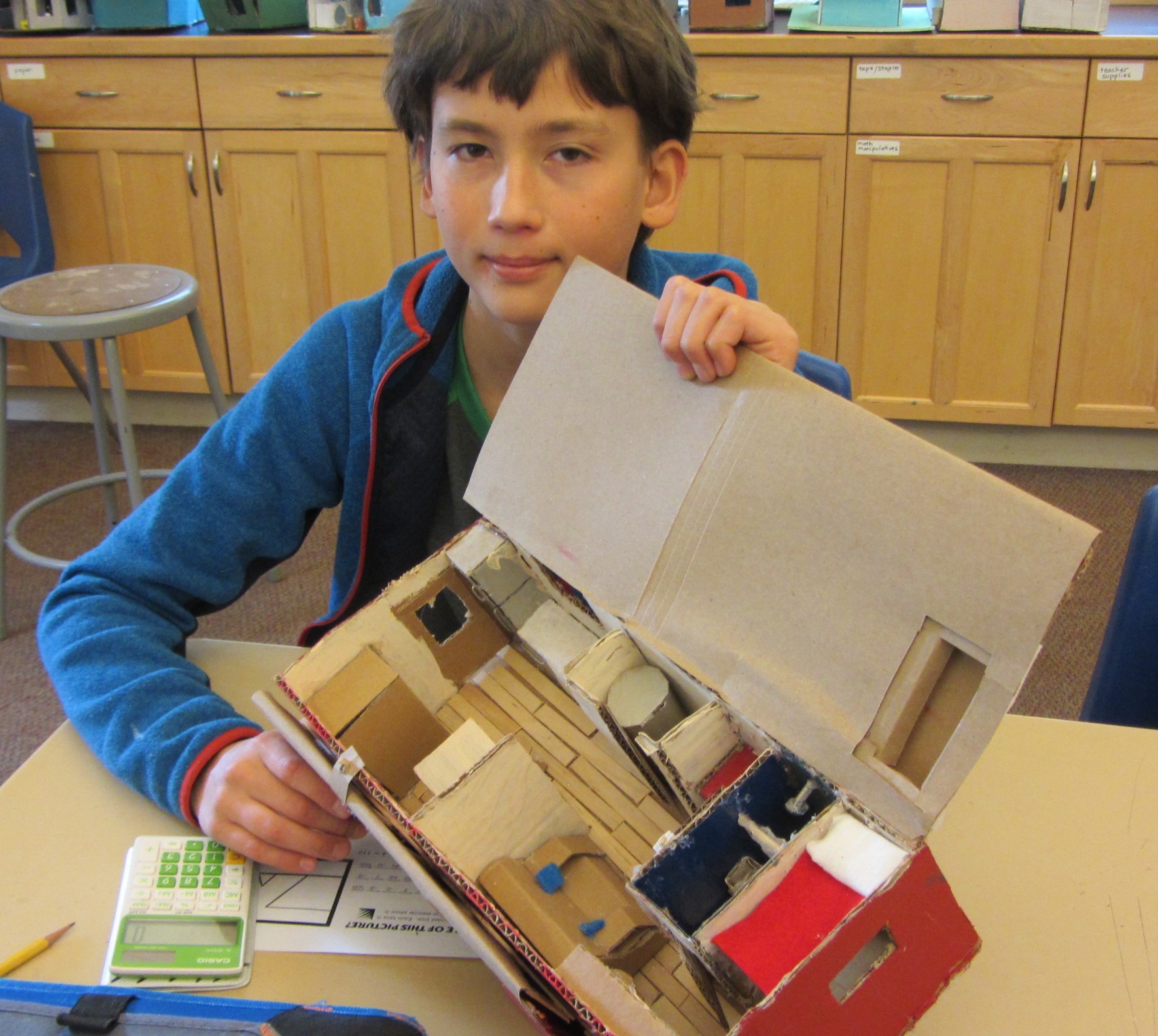 Tiny homes, small, portable houses that average 300-400 square feet, are becoming increasingly popular across the country. Recently Mount Madonna School (MMS) seventh graders learned more about tiny homes during their mathematics class, with the creation of very tiny, three-dimensional, scale-model houses.
Tiny homes, small, portable houses that average 300-400 square feet, are becoming increasingly popular across the country. Recently Mount Madonna School (MMS) seventh graders learned more about tiny homes during their mathematics class, with the creation of very tiny, three-dimensional, scale-model houses.
“In class students were learning about the concept of scale, and I wanted a way to apply the concept in a practical situation,” explained teacher Hilary Alvarado. “I introduced the project by showing students a video of a 16-year-old who built his own tiny house. This young man took his tiny home to college to live in! The video caught my students’ interest and showed them that this creative math and engineering project has real-world application.”
 Students could choose to work independently or with a partner to create a blueprint of their house and complete a calculations worksheet and 3-D scale model.
Students could choose to work independently or with a partner to create a blueprint of their house and complete a calculations worksheet and 3-D scale model.
Their first steps involved calculating the square footage of their home, determining the types and amounts of materials they would need, as well as the total materials cost. The students were assessed on the sustainability, home features, engineering and the overall aesthetic design of their tiny houses.
“I liked applying the concepts we were learning about with a hands-on project, and not just reading about them in a textbook,” commented seventh grader Wyatt Adams
 “From making our blueprint to messing up and having to redo it, to working with a partner and creating our tiny house, I learned a lot and enjoyed the whole process,” said classmate Ona Musoll-Buendia. “I liked the challenge of making it all fit in a certain amount of space.”
“From making our blueprint to messing up and having to redo it, to working with a partner and creating our tiny house, I learned a lot and enjoyed the whole process,” said classmate Ona Musoll-Buendia. “I liked the challenge of making it all fit in a certain amount of space.”
Alvarado said she wanted students to incorporate design principles addressing sustainability and minimizing the ecological footprint of their tiny home.
 “I asked them to integrate design concepts such as solar panels, a rainwater catchment system or barrels, composting toilet, and to use renewable resources for flooring,” she said. “They had the option to incorporate wind power or another alternative energy source.”
“I asked them to integrate design concepts such as solar panels, a rainwater catchment system or barrels, composting toilet, and to use renewable resources for flooring,” she said. “They had the option to incorporate wind power or another alternative energy source.”
The students had to research types and cost of flooring, and the cost, scaled up, for a real house. Finally – and importantly – students had two additional criteria for their project: a small “footprint,” between 100 and 400 square feet and a maximum of 8.5’ high by 12’ wide by 40’ in length in order to make the tiny home street legal.
“Between the blueprint and the model house, there was a lot of precision required,” commented seventh grader Paris Mahoney. “You had to be so precise. If you were off on a measurement by even part of an inch, for example, the staircase might not fit.”
 Classmate Anya Gonzalez agreed: “While I like making something hands-on, it was challenging to have to measure every little part.”
Classmate Anya Gonzalez agreed: “While I like making something hands-on, it was challenging to have to measure every little part.”
The homes would need to include a kitchen with refrigerator, stove and sink; a bathroom with composting toilet and shower, a bed/sleeping area and dining table with seating.
“It had to be a livable space,” said Alvarado. “And it had to be road-legal, so no more than the maximum dimensions.”
 Students were required to draw their blueprints to scale using architectural symbols, with half an inch equaling one foot. Students were introduced to architectural blueprint symbols for walls, windows, doors with the swing direction, sliding doors and door placement. They also learned about symbols for showing placement of features – including sinks, dishwashers, stoves, ovens, washer and dryers, toilets, showers, tubs, and lighting.
Students were required to draw their blueprints to scale using architectural symbols, with half an inch equaling one foot. Students were introduced to architectural blueprint symbols for walls, windows, doors with the swing direction, sliding doors and door placement. They also learned about symbols for showing placement of features – including sinks, dishwashers, stoves, ovens, washer and dryers, toilets, showers, tubs, and lighting.
“The finished houses definitely exceed my expectations,” said Alvarado. “The students’ attention to the level of detail with tiny fixtures, lofts, pop-up details. One student wanted to include a deck, but because the deck exceeded the overall dimensions, he made it into a fold-out deck to keep the house in compliance with road-legal specs. Very clever.”
 Once the homes were completed, they did a “gallery walk” through their classroom, and shared feedback with their peers. Using sticky notes, students could tell their classmates what they liked about their tiny homes, share any questions they had, and offer suggestions for improvement. At least a couple of students took the feedback to heart, and took their houses home over the weekend to make some changes.
Once the homes were completed, they did a “gallery walk” through their classroom, and shared feedback with their peers. Using sticky notes, students could tell their classmates what they liked about their tiny homes, share any questions they had, and offer suggestions for improvement. At least a couple of students took the feedback to heart, and took their houses home over the weekend to make some changes.
About half of the students in the class said they had been inside an actual tiny house before. Seventh grader Josie Moran said the “cozy space” made her feel safe, and she appreciated being able to collaborate with a partner on the project.
 “My dad has built a couple of tiny houses,” noted classmate Cooper Padilla. “It was really cool seeing the process up close and what goes into it.
“My dad has built a couple of tiny houses,” noted classmate Cooper Padilla. “It was really cool seeing the process up close and what goes into it.
The students will display their blueprints and tiny houses at the annual Summit for the Planet celebration on April 27.
####
Contact: Leigh Ann Clifton, director of marketing & communications,
Nestled among the redwoods on 355 acres, Mount Madonna School (MMS) is a community of learners dedicated to creative, intellectual, and ethical growth. MMS supports its students in becoming caring, self-aware, discerning and articulate individuals; and believe a fulfilling life includes personal accomplishments, meaningful relationships and service to society. The CAIS and WASC accredited program emphasizes academic excellence, creative self-expression and positive character development. Located on Summit Road between Gilroy and Watsonville. Founded in 1979.




